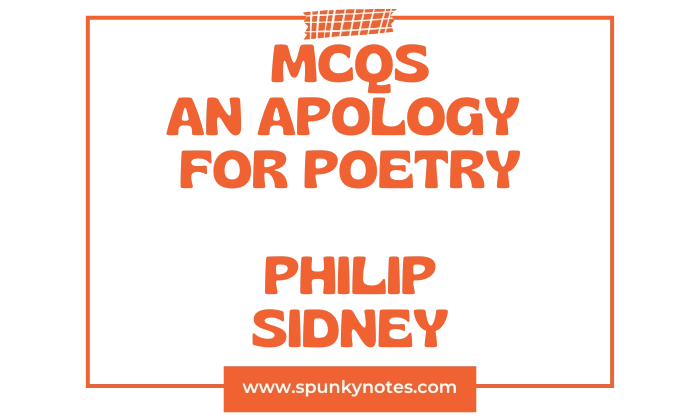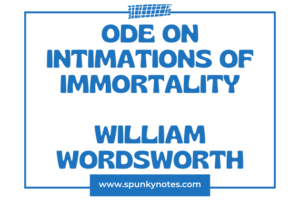

Estimated Reading Time: 16 min
🡆Before you begin the quiz, ensure you’re fully prepared by reading a complete summary and analysis of An Apology for Poetry.
An Apology for Poetry MCQs (Top 50)
1. Sidney was inspired to defend poetry by John Pietro Pugliano, who was a—
A. philosopher
B. soldier
C. horse-master
D. painter
2. Sidney felt a need to defend poetry because in his era it had become the—
A. profession of kings
B. “laughing-stock of children”
C. most profitable art
D. primary tool of the church
3. The philosopher who famously criticized poets yet still used poetic methods himself was—
A. Thales
B. Plato
C. Herodotus
D. Pythagoras
4. The ancient Roman word for a poet, “vates,” means diviner, foreseer, and—
A. maker
B. teacher
C. prophet
D. singer
5. Sidney explains that the Greek word “Poetes” literally means—
A. “to speak”
B. “to delight”
C. “tó imitate”
D. “to make”
6. The term Sidney uses to describe the flawed, ordinary world of Nature is—
A. silver
B. brazen
C. iron
D. leaden
7. Sidney borrowed the philosophical concept of mimesis, or an “art of imitation,” from—
A. Plato
B. Aristotle
C. Socrates
D. Empedocles
8. The true purpose of all learning, in Sidney’s view, is to—
A. accumulate knowledge
B. pursue personal wealth
C. inspire “virtuous action”
D. gain social power
9. A key weakness of the philosopher’s teaching, according to Sidney, is that it is too—
A. concrete and specific
B. abstract and general
C. emotional and passionate
D. simple and childish
10. The historian’s main limitation is being tied to “what is,” which refers to—
A. what should ideally happen
B. what actually happened
C. what is believed to be true
D. what the gods have decreed
11. For Sidney, the power to __________ is “of a higher degree than teaching” because it inspires action.
A. know
B. move
C. see
D. speak
12. The one English play Sidney commends for its strong moral message is—
A. Hamlet
B. Gorboduc
C. Doctor Faustus
D. The Spanish Tragedy
13. The final curse Sidney wishes upon those who scorn poetry is that their memory will—
A. be eternally mocked
B. be plagued by bad rhymes
C. die for want of an epitaph
D. only be remembered by philosophers
14. The author feels compelled to defend poetry because it acted as a nurturing “__________” that helped cultivate early knowledge.
A. mother
B. nurse
C. teacher
D. guide
15. Sidney argues that the Psalms of David are a “divine poem” because their prophecy is—
A. “merely poetical”
B. historically accurate
C. scientifically sound
D. philosophically complex
16. In contrast to all other professions who are observers, Sidney states the poet is unique because they are not—
A. bound by the rules of logic
B. required to be virtuous
C. tied to any such subjection
D. respected by the general public
17. The poet’s ability to create a better, golden world shows that humanity shares a spark of—
A. philosophical insight
B. historical understanding
C. divine creativity
D. scientific curiosity
18. Sidney’s definition of poetry as a “speaking picture” means it creates an image so vivid it—
A. must be drawn or painted
B. requires musical accompaniment
C. speaks directly to the reader’s soul
D. can only be understood by the educated
19. The type of poetry that imitates “the unconceivable excellencies of God” is called—
A. Philosophical Poetry
B. Right Poetry
C. Divine Poetry
D. Heroical Poetry
20. The true “makers,” according to Sidney, are the “Right Poets” who use their imagination to create stories about—
A. what once was and will be again
B. what is, hath been, or shall be
C. what the philosophers have decreed
D. what may be and should be
21. The highest or “mistress-knowledge,” which has the goal of “well-doing,” was called by the Greeks—
A. Gnosis
B. Praxis
C. Mimesis
D. Architektonike
22. The Pastoral Poem, according to Sidney, often serves a moral and __________ function.
A. religious
B. historical
C. scientific
D. political
23. Sidney states that comedy teaches by showing the “common errors of life” in a __________ way.
A. tragic
B. heroic
C. ridiculous
D. serious
24. Tragedy makes kings fear becoming tyrants by showing the “__________ of this world.”
A. beauty
B. certainty
C. uncertainty
D. justice
25. Sidney says the Lyric Poem’s goal is to praise virtuous actions and inspire listeners with—
A. patriotic fervor
B. moral lessons
C. religious doubt
D. a desire for laughter
26. The Epic Poem makes virtues like “magnanimity and justice shine” by dressing them in their—
A. “workday clothes”
B. “holiday apparel”
C. “armor of logic”
D. “veil of fables”
27. Sidney criticizes English plays for absurdly showing decades of events in just—
A. one day
B. one hour
C. two hours
D. three acts
28. The mingling of “kings and clowns” in English tragedy ruins the proper feeling of “admiration and __________.”
A. delight
B. commiseration
C. sportfulness
D. sorrow
29. Sidney argues that true delight comes from things that are harmonious and—
A. absurd
B. disproportioned
C. beautiful
D. sinful
30. Sidney criticizes contemporary love poems for using “fiery speeches” that lack true passion, or—
A. mimesis
B. energeia
C. praxis
D. gnosis
31. Sidney praises the English language because it is a “mingled language” taking the best from—
A. Latin and Greek
B. the other languages it comes from
C. the royal court
D. the common people
32. Sidney argues that the English language is naturally good for modern verse because its words have clear—
A. spellings
B. origins
C. stress patterns
D. definitions
33. In his final summary, Sidney claims the accusations against poetry are “either false or __________.”
A. blasphemous
B. feeble
C. complicated
D. ungrateful
34. The reason England fails to value poetry, according to Sidney, is because of “poet-apes,” not—
A. philosophers
B. true poets
C. historians
D. the language
35. The people who speak against poetry are fundamentally __________, according to Sidney.
A. foolish
B. ungrateful
C. uneducated
D. impious
36. Sidney believes the universal love for poetry proves it is the first necessary step towards all other forms of—
A. entertainment
B. religious worship
C. social status
D. learning
37. Sidney states that practitioners of all other arts and sciences remain fundamentally limited to studying—
A. the future
B. what already exists
C. the abstract world
D. the human soul
38. Sidney’s “erected wit” refers to the human intellect’s ability to grasp the idea of—
A. God
B. the past
C. perfection
D. infinity
39. The type of poetry that is “wrapped within the fold of the proposed subject” and cannot use invention freely is—
A. Divine Poetry
B. Right Poetry
C. Heroical Poetry
D. Philosophical Poetry
40. Because poetry deals with the universal ideal (“what should be”), Sidney states it is superior to history, which is stuck with the—
A. divine
B. abstract
C. particular
D. future
41. The main reason the poet wins the “laurel crown” over the philosopher is for the ability to move people to—
A. well-thinking
B. well-speaking
C. well-knowing
D. well-doing
42. In Sidney’s view, comedy teaches by contrasting the “filthiness of evil” with the—
A. Holiness of the divine
B. Certainty of history
C. Beauty of virtue
D. Complexity of philosophy
43. The knowledge of oneself, with the final end of “well-doing,” is the supreme knowledge Sidney calls—
A. Mimesis
B. Energeia
C. Architektonike
D. Poetes
44. The poet excels at solving the main challenge of moving people to do—
A. what is profitable
B. what is easy
C. whát is right
D. what is popular
45. Sidney’s overall goal in his discussion of style is to identify the “common infection” of overly ornate writing so that writers can return to a right use of matter and—
A. rhyme
B. inspiration
C. manner
D. passion
46. In his final plea, Sidney wants readers to believe that poets write from a—
A. Divine fury
B. Philosophical calm
C. Historical duty
D. Sense of humor
47. A key way poets create their “golden” world is by inventing __________ who serve as models for humanity.
A. new languages
B. complex philosophies
C. perfect characters
D. alternate histories
48. Sidney believes that the people of __________ are held in “devout reverence.”
A. Turkey
B. Wales
C. Greece
D. Ireland
49. Sidney says poetry purposefully hides mysteries “under the veil of fables” so that “__________” cannot abuse them.
A. common people
B. kings and tyrants
C. profane wits
D. rival poets
50. In his humorous conclusion, Sidney says poets can make you immortal by placing your soul among figures like Virgil’s—
A. Aeneas
B. Dido
C. Anchises
D. Turnus
Brief Overview
An Apology for Poetry is a work of literary criticism by Sir Philip Sidney. It was written around 1580, but published posthumously in 1595. It is considered the most important piece of English criticism from the Renaissance period.
The essay is Sidney’s defense of the value and purpose of poetry. He wrote it in response to Puritan attacks that called poetry a waste of time and a corrupting influence. Sidney argues that poetry is the oldest and best form of learning.
Sidney makes a famous claim that poetry is superior to both history and philosophy. History only shows what was or is, and philosophy only teaches abstract concepts. Poetry, however, combines the two.
He says the poet creates a “golden world”—a perfect world that teaches virtue through examples. The poet, unlike the historian, can show ideal characters. Unlike the philosopher, the poet gives concrete, engaging examples that move the reader to action.
Sidney addresses the common charges against poetry, such as that it is full of lies. He argues that the poet “nothing affirms, and therefore never lies.” The poet simply offers imaginative models. The true goal of poetry, he concludes, is to teach and delight the reader toward virtuous action.


